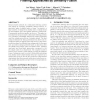Free Online Productivity Tools
i2Speak
i2Symbol
i2OCR
iTex2Img
iWeb2Print
iWeb2Shot
i2Type
iPdf2Split
iPdf2Merge
i2Bopomofo
i2Arabic
i2Style
i2Image
i2PDF
iLatex2Rtf
Sci2ools
125
click to vote
SIGIR
2006
ACM
2006
ACM
Unifying user-based and item-based collaborative filtering approaches by similarity fusion
Memory-based methods for collaborative filtering predict new ratings by averaging (weighted) ratings between, respectively, pairs of similar users or items. In practice, a large number of ratings from similar users or similar items are not available, due to the sparsity inherent to rating data. Consequently, prediction quality can be poor. This paper reformulates the memory-based collaborative filtering problem in a generative probabilistic framework, treating individual user-item ratings as predictors of missing ratings. The final rating is estimated by fusing predictions from three sources: predictions based on ratings of the same item by other users, predictions based on different item ratings made by the same user, and, third, ratings predicted based on data from other but similar users rating other but similar items. Existing user-based and item-based approaches correspond to the two simple cases of our framework. The complete model is however more robust to data sparsity, be...
| Added | 14 Jun 2010 |
| Updated | 14 Jun 2010 |
| Type | Conference |
| Year | 2006 |
| Where | SIGIR |
| Authors | Jun Wang, Arjen P. de Vries, Marcel J. T. Reinders |
Comments (0)

